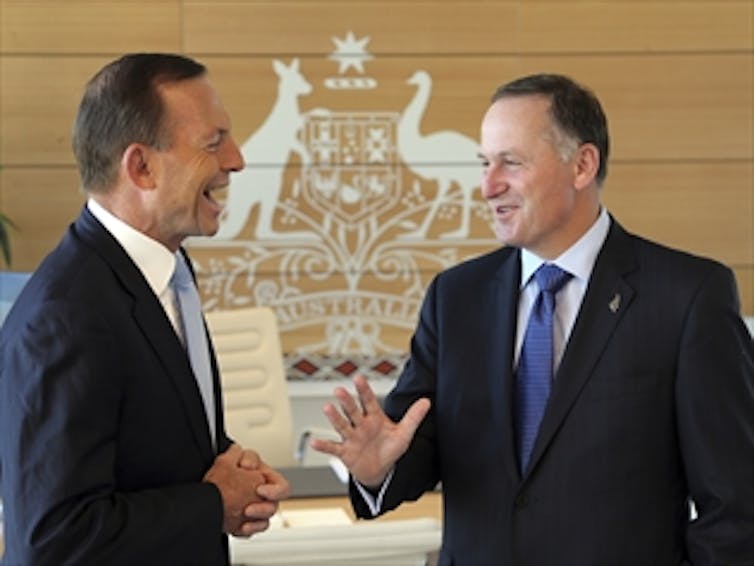The G20 is full of traps for the unwary punter, new to its byzantine ways. There are not 20 member countries in the G20, for example. There are 19 countries, plus the European Union. In November, you will be able to play endless games guessing all the names of the leaders of Argentina, Australia, Brazil, Canada, China, France, Germany, India, Indonesia, Italy, Japan, Republic of Korea, Mexico, Russia, Saudi Arabia, South Africa, Turkey, the United Kingdom, the United States and the European Union. (Probably every Australian will get President Putin right).
Nigeria was supposed to have been number 20, but was not in the end included. The name stuck. This is the perfect way to win a Brisbane trivia night (you’re welcome).
But I hear you ask - what is New Zealand Prime Minister John Key doing at the G20 then?

Each year the G20 president invites about six guest countries to attend the leaders summit to participate for the year. This is seen as a form of outreach to increase the legitimacy of the G20 as the “premier forum for international economic cooperation” due to concerns about the G20’s limited and contentious membership. (No, the G20 members are not the largest 20 economies either in any given year either, as often Switzerland, Sweden, Norway, Nigeria and Iran are in the running depending on how you calculate GDP).
G20 core members committed in its 5th Anniversary Vision Statement to “listen carefully” to the rest of the world, in acknowledgement that the impact of their decisions had global impact.
“As a Forum representing over 80% of the global economy, we have a responsibility to all citizens. We will remain engaged with the international community as a whole and make sure that the interests of countries at all stages of development are taken into account. Nor can we ignore the far-reaching impact of our actions. To this end, we will … listen carefully to all institutions and countries that are not in the Group.”
So far so good. But Spain is a what is known as a “permanent invitee”. What is the difference between a member and a permanent invitee, I hear you cry. No-one knows. Spain always gets to come.
It has also become the custom after several years to invite the Chair of ASEAN; two African countries (the chair of the African Union and a representative of the New Partnership for Africa’s Development (NEPAD). Africa is still underrepresented in the G20, so at least this goes some way to rectify the imbalance, but rotating chairs mean there is not always the corporate knowledge or the capacity to engage in the hundreds of meetings leading up to the Summit. In Brisbane, Australia will welcome Myanmar, as the 2014 Chair of ASEAN; Mauritania, as the 2014 chair of the African Union; and Senegal, representing NEPAD.
So generally, with only two invites where the host gets to actually choose, the President often invites friendly neighbours from the region. Australia has invited New Zealand and Singapore: safe choices.
Since the first leader-level meeting of the G20 in 2008, guests have included Benin, Brunei, Cambodia, Chile, Colombia, Equatorial Guinea, Ethiopia, Kazakhstan, Malawi, the Netherlands, Switzerland, Thailand, the United Arab Emirates and Vietnam. And obviously, Spain.
The G20 is a political dialogue forum, there is no voting as such, no secretariat. Members agree to bind themselves to coordinated action and voluntary targets. It is therefore difficult to determine what impact “guests” have had on the G20 process to date.
A country like Myanmar would no doubt be interested in many issues on the 2014 agenda, such as increasing infrastructure investment for developing countries, sharing of tax information and assisting the easier transfer of remittances. Countries certainly benefit from being inside the high-level discussions and access to leaders, and invitations are sought-after.
What about the non-invitee nations? Even with the G20 plus 6, that leaves out most of the 193 members of the United Nations.
Australian ambassadors, the G20 Special Representative Daniel Sloper, and travelling ministers have been leading G20-related outreach and advocacy events around the world. There is a comprehensive list of DFAT activity here and it is impressive, harking back to our days of tireless campaigning for the Security Council seat. DFAT even allowed a little personality into the Twitter account @G20SR, so that we could get some insight into what it truly means to host a G20 Summit. It looks like thousands of air miles, no sleep, and lots of patient listening.
Outreach for the G20 is crucial. Because who will decide whether the G20 summit in Brisbane is a success in the long term? The rest of the world, who wasn’t invited. And maybe even us citizens, one day.

